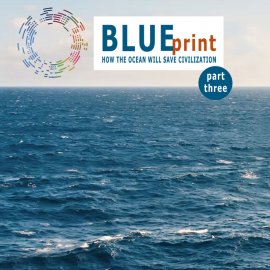What Is Ocean Equity?
-
English
-
ListenPause
[intro music]
Welcome to World Ocean Radio…
I’m Peter Neill, Director of the World Ocean Observatory.
One way to define equity in the ocean is to examine in the inequities that abound. Address those, correct those, and the baseline definition of a very ephemeral concept become clearer as a value established on which to build more specific goals, objectives, and actions. In short, eliminate the negatives, address the necessary change, and establish the positives as new normative policy and behavior. In short, easy to imagine, harder to execute without a plan.
In 2018, the acting heads of government of 14 states established a High Level Panel for a Sustainable Ocean Economy committed “to catalyzing bold, pragmatic solutions for ocean health and wealth.” The Prime Ministers of Australia, Canada, Chile, Fiji, Ghana, Indonesia, Jamaica, Japan, Kenya, Mexico, Namibia Norway, Palau, and Portugal named a panel of scientists, economists, and policymakers to do the research and analysis and recommend specific issues to be addressed through specific actions as outlined in a series of “Blue Papers” applying highest expertise and advocating best practice. Their report, “Toward Ocean Equity,” was released in August 2020. It is clear the Panel took its charge seriously and I want to share some of the results: here are its nine key points on which any future discussion of ocean equity should be based:
• The ocean is important for everyone—it produces oxygen and food, stores carbon and heat, offers space for economic activities and recreation, and continues to inspire and support culture and well-being.
• Access to ocean resources and sectors is rarely equitably distributed. Many of their benefits are accumulated by a few, while most harms from development are borne by the most vulnerable.
• Inequity is a systemic feature of the current ocean economy. It is embedded in existing political and economic systems, the result of historical legacies and prevailing norms. This has brought global environmental challenges and negative effects on human well-being.
• Legal frameworks to support equity exist but are not sufficiently developed. In practice, ocean policies are largely equity-blind, poorly implemented and fail to address inequity.
• Inequity manifests, for example, in unfair distribution of commercial fish catches; limited political power of small-scale fishers, particularly women and other minority groups; limited engagement of developing nations in high-seas activities and associated decision-making; and consolidated interests of global supply chains in a few transnational corporations, with evidence of poor transparency and human rights abuses.
• Climate change will create and worsen challenges of fairness and equity faced by developing countries, regions and communities reliant on marine livelihoods.
• Discussions on environmental sustainability have largely overshadowed concerns about social equity. Addressing inequalities and preventing the widening of ocean inequities are integral to a sustainable ocean economy; and promoting equity is essential for securing fair development, the legitimacy of policies, social stability and sustainability.
• A sustainable ocean economy should protect human rights, improve human well-being, stimulate inclusion and gender equity, and prioritize recognition, diversity and equal access to resources to provide fair opportunities consistent with sustainable development. It should also address corruption and tax evasion, demand responsible and transparent business practices and create a shared economy that facilitates a fair redistribution of wealth and benefits. A sustainable ocean economy should be aware of environmental and social limits on growth and consider de-growth where appropriate.
• Shifting a historical trajectory of persistent and increasing inequities will require strong leadership, inclusive governance and long-term planning that starts with a commitment to equity as integral to a sustainable ocean economy and relationships within and across nations.
These are the starting points for our continuing discussion of a plan for how the ocean will save civilization. Each of them describes an existing condition or known threat that must be considered as we proceed. Each of them posits an inequity that inhibits our way forward. Each of them presents a challenge, calling for critical analysis of the social, financial, and political practices throughout the ocean world that must be addressed and transformed as an answer to our question of saving and survival.
We will discuss these issues, and more, in future editions of World Ocean Radio.
[outro music]
This week on World Ocean Radio: part three of a multi-part series entitled "BLUEprint: How the Ocean Will Save Civilization". In this episode, WHAT IS OCEAN EQUITY?, we dive into the High Level Panel for Sustainable Ocean Economy and their series of Blue Papers and subsequent report entitled "Towards Ocean Equity" released in August 2020. The Report highlights nine key points on which any future discussions of ocean equity should be based.
Part three of a multi-part series
The BLUEprint series will serve to outline a new and sustainable
way forward for civilization, with the ocean leading the way.

About World Ocean Radio
Since 2009, a weekly 5-minute podcast covering a broad spectrum of ocean issues from science and education to advocacy and exemplary projects. World Ocean Radio, a project of the World Ocean Observatory is available for syndicated use at no cost by college and community radio stations worldwide. Contact director@thew2o.net if you are interested in becoming an affiliate or know of a radio station that should be broadcasting these episodes each week.
Image
From the High Level Panel for a Sustainable Ocean Economy
Blue Paper: "Towards Ocean Equity"
Resources from this Episode
- High Level Panel for a Sustainable Ocean Economy Blue Papers
- "Towards Ocean Equity" (Aug 2020) Report
- Login to post comments



